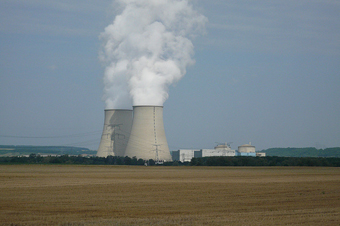IEA warns time is running out to prevent catastrophic climate change
 The world has nearly run out of time to prevent a global temperature rise of 2°C, according to new figures by the International Energy Agency (IEA) that reveal the global energy industry produced record high carbon emissions last year.
The world has nearly run out of time to prevent a global temperature rise of 2°C, according to new figures by the International Energy Agency (IEA) that reveal the global energy industry produced record high carbon emissions last year.The IEA yesterday published a report showing CO2 emissions from fossil-fuel combustion hit 31.6 gigatonnes (Gt) in 2011, just 1Gt below the threshold that scientists say could give the world a 50 per cent chance of preventing a 2°C global temperature rise.
Large numbers of climate scientists are concerned that temperature increases of above 2°C could trigger runaway climate change whereby natural carbon sinks such as permafrost and the Amazon Rainforest start to release greenhouse gas emissions.
The IEA’s so-called 450 Scenario, named for the parts per million atmospherhic concentration of CO2 that is thought to mark the point where runaway climate change could start to occur, requires CO2 emissions to peak at 32.6Gt no later than 2017, which would offer a 50 per cent chance of limiting the increase in the average global temperature to 2°C.
But despite efforts to boost renewable energy supplies and energy efficiency measures, global emissions in 2011 rose by 3.2 per cent compared to 2010, the report said.
Rich countries in the Organisation for Economic Co-operation and Development (OECD) reduced overall emissions last year by 0.6 per cent. However, countries outside the OECD, including China and India, emitted 6.1 per cent more than in 2010.
China made the largest contribution to the global increase, with its emissions rising by 720 million tonnes (Mt), or 9.3 per cent, primarily due to higher coal consumption. India has now become the fourth largest emitter behind China, the US, and the EU, after its emissions rose by 140 Mt, an 8.7 per cent increase on 2010.
IEA chief economist Fatih Birol warned that the world is failing to keep on track to its 450 Scenario.
“The new data provide further evidence that the door to a 2°C trajectory is about to close,” he said.
However, he also praised China’s efforts to invest in cleaner technologies, warning that its CO2 emissions in 2011 would have been 1.5 Gt higher if it had failed to bolster its renewable energy capacity.
“What China has done over such a short period of time to improve energy efficiency and deploy clean energy is already paying major dividends to the global environment,” he said.
The report came as the Chinese Finance Ministry announced this week that it plans to spend $27bn this year alone on on energy efficiency, renewable energy, and emission reduction projects.
In related news, UN Secretary-General Ban Ki-moon has raised fresh fears that talks on climate change are stalling ahead of next month’s Rio +20 summit.
Ban told reporters that talks have been “painfully slow” as negotiators were becoming bogged down on minor details and narrow national interests.
“My message is that this is not the time to argue against any small, small items. Please do not lose (sight of the) bigger picture,” he said. “This is not the end. Rio+20 is just the beginning of many processes so they should be flexible. They should rise above national interests or specific group interests.”
His comments came amid speculation that the latest round of UN climate change talks in Bonn will close today having made limited progress to agree a timetable for talks through to 2015 to agree a new international climate change treaty.
You can return to the main Market News page, or press the Back button on your browser.

